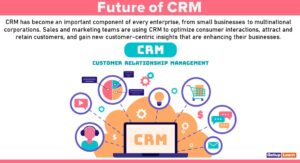Table of Contents
What is the Market?
Knowing your market accurately and completely is a prerequisite for successful marketing. This task is made even more difficult for companies trying to advertise on the Web. Yet, as noted earlier, this trend toward using the Internet will continue. The market can be viewed from many different perspectives and, consequently, is impossible to define precisely.
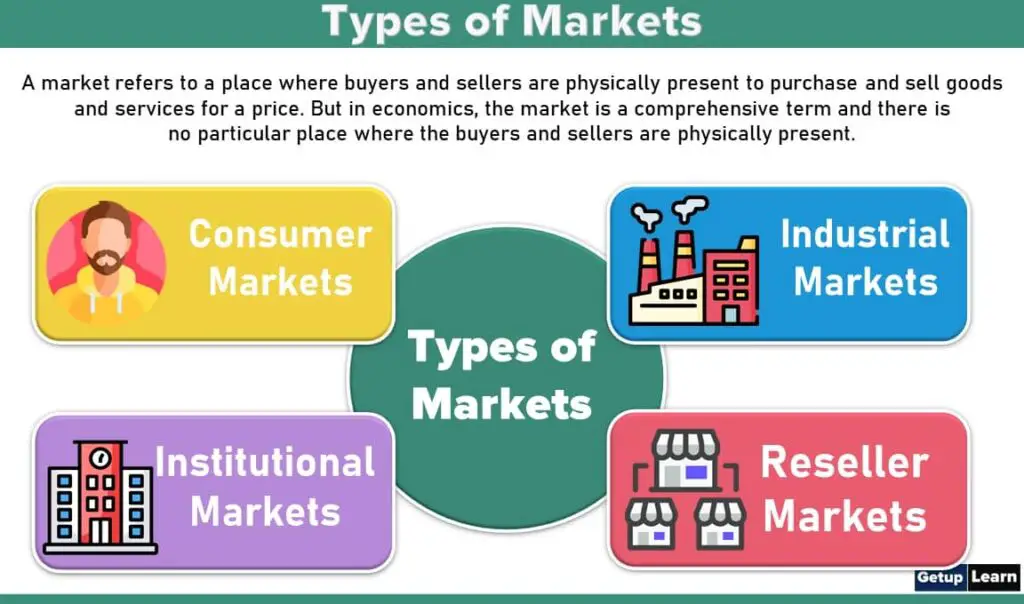
In order to provide some clarity, we provide a basic definition of a market: A group of potential buyers with needs and wants and the purchasing power to satisfy them. Rather than attempting to cut through the many specialized uses of the term, it is more meaningful to describe several broad characteristics and use this somewhat ambiguous framework as the foundation for a general definition.
Types of Markets in Marketing
Following are four different types of markets which are explained below:
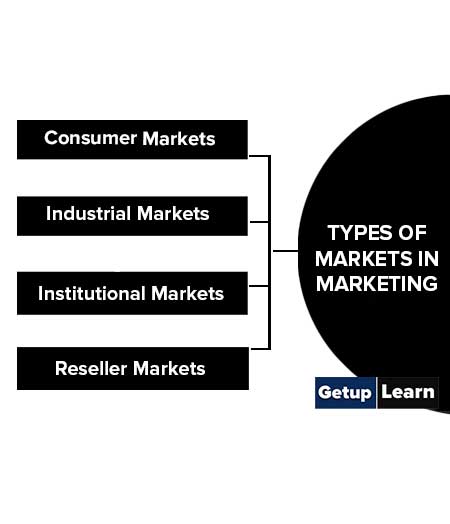
Consumer Markets
When we talk about consumer markets, we are including those individuals and households who buy and consume goods and services for their own personal use. They are not interested in reselling the product or setting themselves up as a manufacturer.
Considering the thousands of new products, services, and ideas being introduced each day and the increased capability of consumers to afford these products, the size, complexity, and future growth potential of the consumer market is staggering.
Industrial Markets
The industrial market consists of organizations and the people, who work for them. Those, who buy products or services for use in their own businesses or to make other products, for example, a steel mill might purchase computer software, pencils, and flooring as part of the operation and maintenance of their business.
Likewise, a refrigerator manufacturer might purchase sheets of steel, wiring, shelving, and so forth, as part of its formal product. These purchases occur in the industrial market. There is substantial evidence that industrial markets function differently than consumer markets and that the buying process in particular is different.
Institutional Markets
Another important market sector is made up of various types of profit and non-profit institutions, such as hospitals, schools, churches, and government agencies. Institutional markets differ from typical businesses in that they are not motivated primarily by profits or market share.
Rather, institutions tend to satisfy somewhat esoteric, often intangible, needs. Also, whatever profits exist after all expenses are paid are normally put back into the institution. Because institutions operate under different restrictions and employ different goals, marketers must use different strategies to be successful.
Reseller Markets
All intermediaries that buy finished or semi-finished products and resell them for profit are part of the reseller market. This market includes approximately 383,000 wholesalers and 1,300,000 retailers that operate in the U.S. With the exception of products obtained directly from the producer, all products are sold through resellers.
Since resellers operate under unique business characteristics, they must be approached carefully. Producers are always cognizant of the fact that successful marketing to resellers is just as important as successful marketing to consumers.
Market Space
Market space is a relatively new concept in marketing which is a virtual marketplace. It is an electronic information exchange environment in which the constraints of physical boundaries are eliminated. Market space is an integration of several marketplaces through technology.
This is the reason it is also called an electronic market space. The term market space was introduced by Jeffrey Rayport and John Sviokla (1994) in their article “Managing in the Marketspace” which appeared in Harvard Business Review. In the article, the author distinguished between electronic and conventional markets.
In a market space, information and/or physical goods are exchanged, and transactions take place through computers and networks. These networks consist of blogs, forum threads, and micro-blogging services like Twitter.
Businesses and their customers are enabled to create conversations and two-way communications about products and services. These conversations may also happen outside the sphere of control of a given business when a marketing campaign or customer service issue captures the attention of web-savvy consumers.
Characteristics of Market Space
Following are the characteristics of market space:
- Transactions happen through the internet or online media.
-
Content: There is information about the products available, not the products themselves.
-
Context: Instead of a face-to-face transaction, it is through an electronic medium.
- Infrastructure: Actual stores and showrooms are replaced by computers and the internet.
Advantages of Market Space
Following are the advantages of market space given below:
- Lesser costs because transportation costs and stocking costs are reduced.
- Convenience to the consumers. They need not travel around to research or purchase.
- It is present everywhere, so the problem of unavailability or inaccessibility doesn’t arise.
- No rent for stores like the marketplace.
- Greater information richness.
- Lower information search costs for buyers.
- Diminishes information asymmetry between sellers and buyers.
- The greater temporal separation between the time of purchase and the time of possession.
- Greater temporal proximity between the time of purchase and the time of possession.
- Enables buyers and sellers to be in different locations.
Components of Market Space
Similar to a marketplace, in a market space sellers and buyers exchange goods and services for money (or for other goods and services if bartering is used), but they do it electronically. A marketspace includes electronic transactions that bring about a new distribution of goods and services.
The major components and players of a market space are customers, sellers, goods (physical or digital), infrastructure, a front end, a back end, intermediaries and other business partners, and support services.
Following are the components of market space given below:
- Customers
- Sellers
- Products
- Infrastructure
- Back End
- Intermediaries
- Other Business Partners
- Support Services
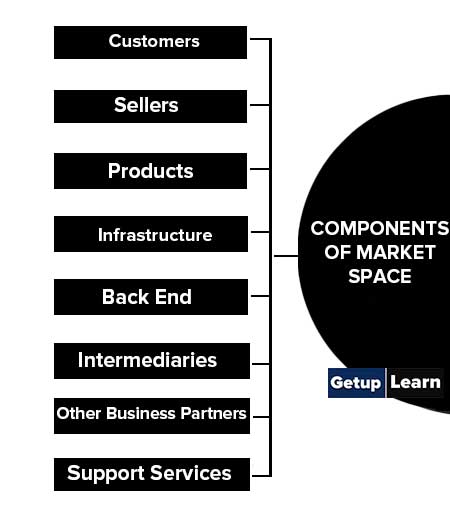
Customers
The tens of millions of people worldwide that surf the Web are potential buyers of the goods and services offered or advertised on the Internet. These consumers are looking for bargains, customized items, collectors’ items, entertainment, and more.
They are in the driver’s seat. They can search for detailed information, compare, bid, and sometimes negotiate. Organizations are the major consumers, accounting for over 85 percent of EC activities.
Sellers
Hundreds of thousands of storefronts are on the Web, advertising and offering millions of items. Every day it is possible to find new offerings of products and services. Sellers can sell directly from their Web site or from a-marketplaces.
Products
One of the major differences between the marketplace and the market space is the possibility of digitization of products and services in a market space. Although both types of markets can sell physical products, the market space also can sell digital products, which are goods that can be transformed into digital format and delivered over the Internet.
In addition to the digitization of software and music, it is possible to digitize dozens of other products and services. In digitization, most of the costs are fixed and the variable cost is very small. Thus, profit will increase very rapidly as volume increases once the fixed costs are paid for. This is one of the major potentials of electronic markets.
Infrastructure
An electronic market infrastructure includes hardware, software, and networks. Front end Customers interact with a market space via a front end. The business processes in the front end include the seller’s portal, electronic catalogs, a shopping cart, a search engine, and a payment gateway.
Back End
All the activities that are related to order aggregation and fulfillment, inventory management, purchasing from suppliers, payment processing, packaging, and delivery are done in what is termed the back end of the business.
Intermediaries
In marketing, an intermediary typically is a third party that operates between sellers and buyers. Intermediaries of all kinds offer their services on the Web. Online intermediaries create and manage online markets (such as in the NTE case).
They help match buyers and sellers, provide some infrastructure services, and help customers and/or sellers institute and complete transactions. Most of these online intermediaries are computerized systems.
Other Business Partners
In addition to intermediaries, there are several types of partners, such as shippers, that collaborate on the Internet, mostly along the supply chain.
Support Services
Many different support services are available, ranging from certification and trust services, which ensure security, to knowledge providers. These services are created to address implementation issues.
Types of E Marketplaces
These are the types of e-marketplaces:
- Electronic Storefronts
- E-mall or Online Mall
- E-marketplace
- Private E-marketplaces
- Sell-side E-marketplace
- Buy-side E-marketplace
- Public E-marketplaces
- Information Portal
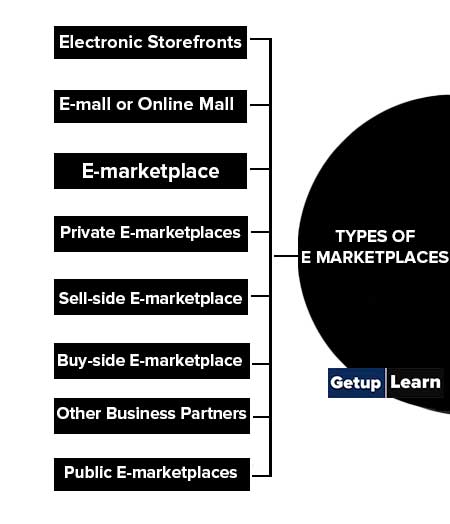
Electronic Storefronts
A single company’s Web site where products or services are sold. The most common mechanisms are:
- Electronic Catalog
- Search Engine
- Electronic Cart
- E-auction Facilities
- Payment Gateway
E-mall or Online Mall
It is an online shopping center where many online stores are located. Different types of Stores and Malls are:
- General stores/malls
- Specialized stores/malls
- Regional versus global stores
- Pure online organizations versus click-and-mortar stores.
E-marketplace
An online market, usually B2B, is where buyers and sellers exchange goods or services; the three types of e-marketplaces are private, public, and consortia.
Private E-marketplaces
Online markets owned by a single company; may be either sell-side or buy-side e-marketplaces.
Sell-side E-marketplace
A private e-marketplace in which a company sells either standard or customized products to qualified companies.
Buy-side E-marketplace
A private e-marketplace in which a company makes purchases from invited suppliers.
Public E-marketplaces
B2B marketplaces, usually owned and/or managed by an independent third party, that include many sellers and many buyers; also known as exchanges.
Information Portal
A single point of access through a Web browser to business information inside and/or outside an organization. The major types of portals are:
- Commercial (public) portals: A portal accessible via a mobile device.
- Corporate portals: A portal accessed by telephone or cell phone.
- Publishing Portals.
- Personal Portals.
- Mobile Portals
- Voice Portals
Difference Between Marketspace and Marketplace
A market space differs from a marketplace in the fact that it is bi-directional unlike market place, which is uni-directional. Here, not only sellers can list their products, but buyers can also list their needs. When there is a similarity between the needs of the buyer and the product offered by the seller, a transaction takes place. Examples of such market spaces are ebay.com and quicker.com.
Difference between Market and Marketing
In the business world, you have heard the terms market and marketing end a number of times. A question arises in the mind of many people that these two terms are same or different? The term marketing is derived from the term market, but these two signify different meanings and hence they are not one and the same thing.
A market refers to a place where buyers and sellers can meet and trade. On the other end, we have marketing, which is a process that involves some activities which create value for customers, clients, and society as a whole. So, here we go to describe the substantial differences between market and marketing.
The important points of differences between market and marketing are indicated below:
- The market is defined as a physical or virtual setup where the buyers and seller need to proceed exchange of goods and services. Marketing is a set of activities that identifies, creates, communicates, and supplies consumer needs.
- A market is a place, i.e. physical or non-physical. On the other hand, marketing is an act (abstract) of creating a utility of the product.
- The market is a process that sets the price of the product with demand and supply forces. Conversely, Marketing is a process that analyses, creates, informs, and delivers value to the customers.
- The concept of marketing is wider than the concept of a market.
- The market varies by product, place, and other factors. As opposed to marketing, the philosophy can be consistently applied, irrespective of product, place, and any other factor.
- The market facilitates trade between the parties. Unlike marketing, which creates a link between the customer and company, to provide the right product at a right time at the right place.
What are the types of markets?
Types of markets are given below:
1. Consumer Markets
2. Industrial Markets
3. Institutional Markets
4. Reseller Markets.
What are the components of market space?
Components of Market Space:
1. Customers
2. Sellers
3. Products
4. Infrastructure
5. Back End
6. Intermediaries
7. Other Business Partners
8. Support Services.
What are the types of e-marketplaces?
These are the types of e-marketplaces:
1. Electronic Storefronts
2. E-mall or Online Mall
3. E-marketplace
4. Private E-marketplaces
5. Sell-side E-marketplace
6. Buy-side E-marketplace
7. Public E-marketplaces
8. Information Portal.








